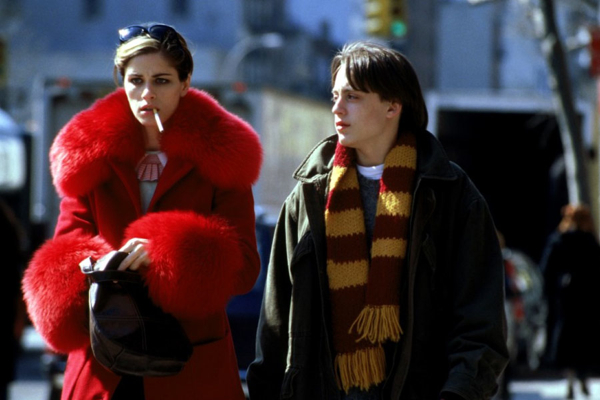Movie review by Greg Carlson
Movies about smarty-pants teenage boys who think of themselves as tortured, misunderstood souls are not everyone’s idea of a swell time, but filmmakers keep cranking them out – and are not likely to stop in the near future (blame Salinger, I guess). From “The Graduate” to “Harold and Maude” to “Rushmore,” the pissed-at-the-world viewpoint of the sullen young man is catnip to the pissed-at-the-world young movie director, even though by now we are all familiar with the concept that the world isn’t fair, rich people are suspect, adults are generally weak-willed cheats, and pretty girls will make a snack of your heart while you gasp and writhe on the floor.
This is the general idea of Burr Steers (how is that for a movie-perfect name?), whose “Igby Goes Down” introduces us to a family of wealthy, messed-up miscreants and their hangers-on. Young Jason “Igby” Slocumb, Jr. (expertly inhabited by Kieran Culkin) is not yet eighteen, but has managed to find himself booted out of every private school foolish enough to accept his mother’s money. Igby’s orbit includes his snooty older brother Oliver (Ryan Phillipe), his institutionalized dad Jason (Bill Pullman), his overbearing mom Mimi (Susan Sarandon), his serpentine godfather D.H. (a wickedly wonderful Jeff Goldblum, stealing every scene in which he appears), D.H.’s junkie mistress Rachel (Amanda Peet), Rachel’s performance artist pal Russel (Jared Harris), and ice cream sundae enthusiast/Igby’s love interest Sookie (Claire Danes).
While the novel-like structure of the movie allows the viewer to sort out the self-absorption in between the liaisons and blow-ups, Steers works up a sweat in order to gain a few scraps of audience sympathy for the callow Igby. Dripping acid, the director’s own screenplay never misses an opportunity to have its characters say and do things meant to elicit gasps from the audience (the film begins with Igby and Oliver hastening Mimi’s death with a plastic bag over her head). The arch, sarcastic tone is likely to be taken as either the movie’s primary asset or greatest liability – depending on the stomach one has for pitch black comedy. Only a small handful of sympathy-inducing flashbacks to Igby’s childhood (with Rory Culkin standing in for his older brother) lift the veil on the nearly omnipresent bitterness.
The triumph of casting Kieran Culkin in the title role is that he is able to simultaneously irritate and charm as the insufferable Igby. Even though his bad behavior is always neatly explained and excused (via the horrors of his unfortunate upbringing), Igby hones his ironic rejoinders to an edge so fine that they nearly account for his uncanny ability to lure Rachel and Sookie into his bed. And while it is somewhat hard to believe that Igby should prove adorably irresistible to not one but two older women, the casual sexual attitude evinced by the characters contributes to the feeling of wayward emptiness that is the glue of Igby’s fragile lifestyle.
Culkin’s performance proves that what Steers lacks in depth he makes up for in characterization, and the filmmaker’s well-observed takes on the supporting roles elevate the movie above its prima facie shallowness. Goldblum, for example, is so compelling that one could easily imagine a whole movie dedicated to his repugnant adulterer – the scene in which he turns on Igby, for example, is frighteningly believable, as is the stunning moment when he walks out of a restaurant without saying a word to the speechless, discarded Rachel. “Igby Goes Down” is not always this consistent, but at its best, it overcomes its own smugness to reveal a satisfying wit.
